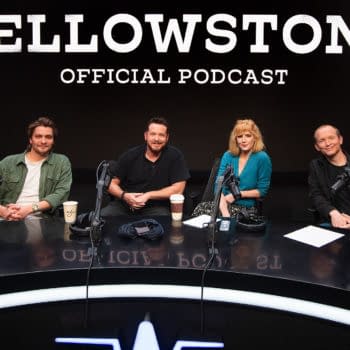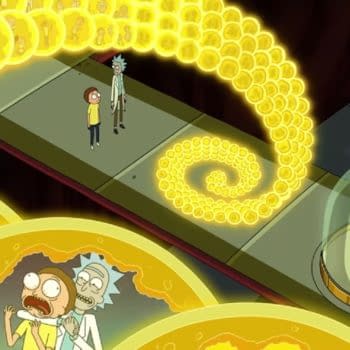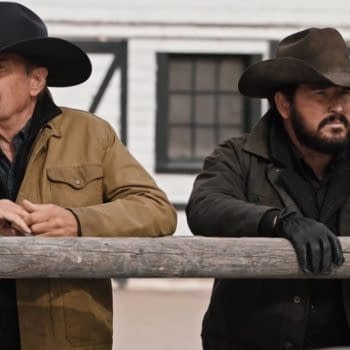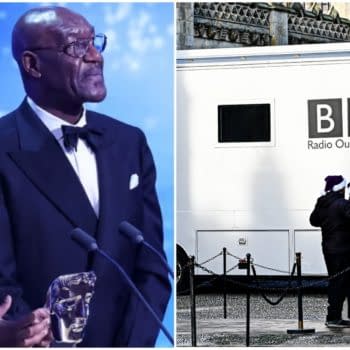Posted in: MGM, Movies | Tagged: Goldfinger, honor blackman, james bond, sean connery
007 Bond Binge: Goldfinger Sets Up the Good & Bad Classic Bond Tropes
Goldfinger is, in so many ways, the seminal film in the James Bond 007 film franchise. It provides some of the most iconic moments, best lines, and defined the look and feel of the best and worst of the films, especially during the Sean Connery era. This is in so many ways also for better or worse, considering some of the tropes originating in this film that would become standards for the series, including fridged women and sexual assault.
These tropes became the Bond template: James Bond is dispatched to investigate some small crime or issue, which then turns out to be the tip of a larger world-domination plot. In this case, the British government wants to know how a certain Mr. Auric Goldfinger (Gert Fröbe) can (illegally) move stockpiles of gold across the world, circumventing tariffs and exchange rates, which he then uses to fund various industries both legitimate and illegitimate. Bond then discovers Goldfinger intends to irradiate the gold supply of the United States at Ft. Knox, making his gold stores increase many times in value and plunging the West into economic chaos.
First Girls and Fridging
Again, setting the template for future films, Goldfinger is aided by several Femme Fatales. The "first girl," Jill Masterson (Shirley Eaton) is aiding Goldfinger in his petty crimes, specifically, helping him cheat at cards. When Bond intercedes and instead seduces Masterson, Goldfinger loses. In retribution has his manservant Oddjob (Harold Sakata) knock out Bond, murder poor Jill, and paint her in gold, leaving her in Bond's bed. This gold girl symbology has been tied to Bond ever since and remains one of the most iconic visuals of the entire series of 25 films, beginning the uncomfortable mixing of sex and death that the franchise often trades in.
This, of course, starts the terrible "First Girl" trope of the James Bond series: the first girl 007 sleeps with ends up dead, the second one gets to sail off into the sunset with him and be subject to some terrible double entendre. For most of the next five decades, at least one woman will be fridged to serve Bond's motivations and storyline. Unfortunately, in this film, we double down on this trope as Jill's sister Tilly (Tania Mallett) teams up with Bond in an attempt to take revenge on Goldfinger. Unfortunately, she is unceremoniously shot and dispatched from the story like to make way for one of the most iconic women in the Bond oeuvre.
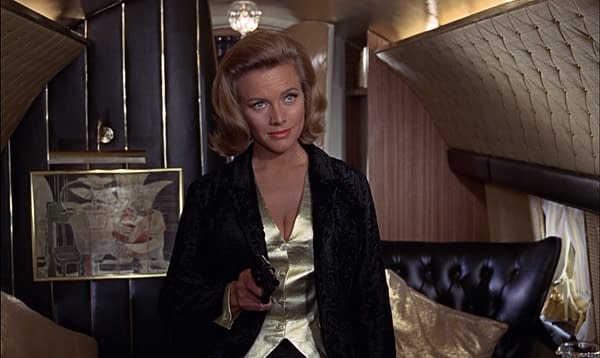
That, of course, would be Pussy Galore (Honor Blackman), who serves as both Goldfinger's pilot and a crucial part of his plot. As the leader of an all-female flight team, they would fly over Ft. Knox spraying knockout gas to incapacitate the troops guarding the gold supply. At first, she seems utterly immune to the charms of James Bond. Unfortunately, that doesn't continue.
While "entertaining" Bond at his horse farm in Kentucky, complete with serving him a fancy mint julep, Goldfinger orders Pussy to take care of 007. There's a really gross relationship between Goldfinger and the women he employs, from the way he touches Pussy to the way he talks to Jill, and eventually has her murdered.
Goldfinger, as a villain, is really sort of perfect. He is single-minded and devious. He also sets the trope for all future Bond villains of monologuing to them to posture his superiority. This reaches its Platonic ideal in the classic scene where Goldfinger straps Bond to a bar of gold and sets a laser to kill him– crotch first, of course. The repartee is perfect: "Do you expect me to talk?"
"No, Mr. Bond, I expect you to die!"
James Bond, Sexual Agency and Assault
But after freeing Bond and ordering Pussy to "take care" of him, the misogyny gets turned up to 10 when Bond and Pussy enter a barn, and James proffers a roll in the hay. Pussy initially not only refuses, but judo flips Bond into said hay. But as he pulls her down with him, she resists, says no repeatedly, and 007 doesn't take no for an answer. There is no delicate way to put this: James Bond rapes Pussy Galore. She said no. He didn't stop.
And the film just glosses over this detail, normalizing sexual assault and erasing the sexual agency of women for an entire generation of Boomer kids going to see this in theaters in their formative years, and played in syndication for decades since. If you're looking for media that reinforce rape culture, there are few better examples than Goldfinger.
We're also led to believe that Bond's sexual prowess is so good, his penis so magic, that he is able to convince Pussy not to go through with Goldfinger's plan and instead betray him. So the next day, her flight crew sprays harmless nothings on the troops, who all play dead. If you want to see some really terrible "falling down and playing dead" acting, watch this scene of all of the army men falling over. It's laughable in the same way watching that stormtrooper hit his head in Star Wars is great.
A final battle ensues as Bond tries to disarm Goldfinger's nuclear warhead, including a final showdown with the preternaturally strong Oddjob. But the day is saved with only seconds left– another trope that will be repeated through the following films.
For better or worse, Goldfinger, and to a lesser extent, its followup Thunderball would serve as stencils around which the franchise would trace and retrace its steps for the next five decades. Its influence is powerful as a major cultural touchstone of 1964 and after that. That includes a terrible legacy of sexual assault and problematically mixing sex and violence that we're only now beginning to reckon with. Despite that, Goldfinger is one of the most classic Bond films and a must-see for anyone dipping into the franchise.
For previous 007 Bond binges, please see:



